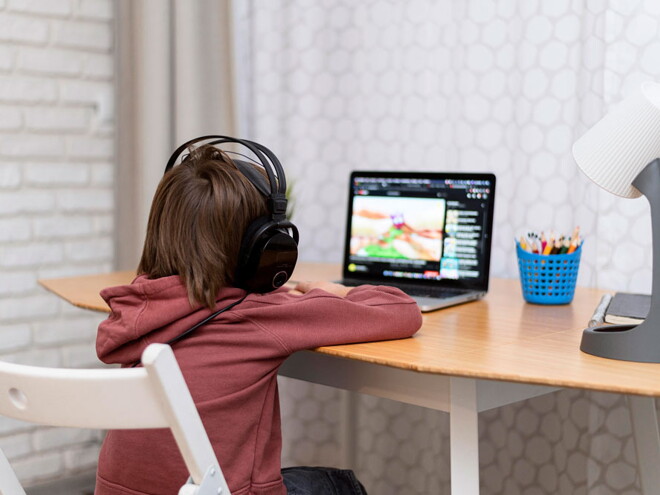
Did the Pandemic Cause Language Delays in Kids?
The pandemic has negatively impacted kids’ speech and memory, but parents can help get them back on track.
Normally, one in six children1 experiences a developmental delay, which manifests as delayed speech development, having a limited vocabulary, or relying on nonverbal cues like pointing instead of speaking. However, a 2022 study revealed that infants born during the pandemic have a significantly higher chance of experiencing developmental delays, almost twice as much as those born before the pandemic.2
In another 2022 study, researchers looked into the level of expressive (how kids use words to express themselves) and receptive (how kids understand) language in kids from 2010 to 2022. Although there have been fluctuations throughout the years, the decline in language skills in kids tested from 2020 to 2022 was particularly alarming.3
Based on these studies, as well as anecdotal evidence, speech delay can happen, and it’s not a cause for worry. You can help your kid get back on track, starting with their nutrition and making sure you’re ahead and prepared for your child’s needs
Myelination and brain development
When it comes to nurturing brain development in early childhood, it's important to pay attention to a crucial process in the brain—myelination. This process helps develop brain connections in the preschool years by providing the foundation for brain connectivity and supporting cognitive and behavioral functioning. Nutrition at this stage can influence myelination and, accordingly, your kid’s cognitive outcomes.
Myelination is also responsible for language advancement in young kids. A study found that the higher the myelination, the better the language development. Researchers noted that the characteristic rapid development in toddlers' vocabulary occurs after myelination occurs in the brain.4
Meanwhile, the opposite, impaired myelination or damaged myelin, has been linked to cognitive deficits.
Support myelination and nurture a gifted brain
Besides giving your preschooler a balanced diet, you can support your kid’s language skills, social skills, and overall brain development with the right brain-boosting milk. The quality of nutrition you give your kid influences the process of myelination and their cognitive abilities, such as receptive and expressive language, memory, speed of processing information, and general cognitive function. A better-supported brain also helps build social skills in preschoolers, which supports language development.
PROMIL Gold® is formulated to boost your gifted kid's brain as it contains the first and only clinically proven* Nutrigift advance ™ blend, which includes Alpha-lipids that promote myelination and support language development. In an MRI study done on infants, PROMIL Gold® has been clinically shown to increase myelination by up to 36%.4
Results show that Alpha-lipids, a complex whey protein concentrate ingredient made from a unique process that retains high levels of phospholipids, including Sphingomyelin, a vital component in myelination. And PROMIL Gold® contains three times higher Sphingomyelin levels compared to the standard.
Besides Sphingomyelin, PROMIL Gold's® Nutrigift advance™ also includes DHA and AA, both of which are crucial for brain development in early infancy; Vitamin B12, which ensures efficient transmission of messages in the brain; Folic Acid, and Iron. This makes PROMIL Gold® your trusted partner in helping your kid develop their language and social skills in kindergarten and beyond.
###
*through an MRI study done on infants
References
-
Zablotsky B, Black LI, Maenner MJ, Schieve LA, Danielson ML, Bitsko RH, Blumberg SJ, Kogan MD, Boyle CA. Prevalence and Trends of Developmental Disabilities among Children in the United States: 2009-2017. Pediatrics. 2019 Oct;144(4):e20190811. doi: 10.1542/peds.2019-0811. PMID: 31558576; PMCID: PMC7076808.
-
Giesbrecht, G., Lebel, C., Dennis, C., Tough, S. C., McDonald, S., & Tomfohr-Madsen, L. (2022, February 3). Increased risk for developmental delay among babies born during the pandemic. https://doi.org/10.31234/osf.io/j7kcn
-
Deoni, S. C., Beauchemin, J., Volpe, A., & Consortium, R. (2022). The COVID-19 Pandemic and Early Child Cognitive Development: A Comparison of Development in Children Born During the Pandemic and Historical References. MedRxiv. https://doi.org/10.1101/2021.08.10.21261846
-
Pujol J, Soriano-Mas C, Ortiz H, et al. Myelination of language-related areas in the developing brain. Neurology 2006, 66:339-343.









